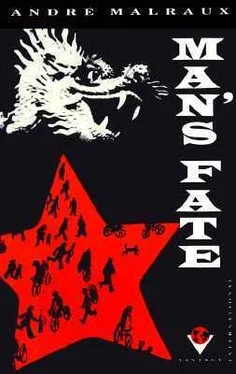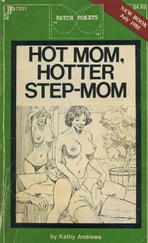Ferral, in the car, was thinking that his relations with women were always the same, and always absurd. Perhaps he had loved, once. Once. What dead-drunk psychologist had had the idea of giving the name of love to the feeling which now poisoned his life? Love is an exalted obsession; his women obsessed him, yes-like a desire of vengeance. He went to women to be judged, he who countenanced no judgment. The woman who would have admired him in the giving of herself, whom he would not have had to fight, would not have existed in his eyes. Condemned to coquettes or to whores. There were their bodies. Fortunately. Otherwise … “You will die, dear, without having suspected that a woman is a human being. …” To her, perhaps; not to him. A woman, a human being! She is relaxation, a voyage, an enemy. .
He picked up a courtesan on the way in one of the houses on Nanking Road: a girl with a gentle, pleasing face. Beside him in the car, with her hands resting modestly on her zither, she looked like a T’ang statuette. They arrived at his place at last. He strode up the steps ahead of her, his usual long step now falling heavily. “Let’s go and sleep,” he was thinking. Sleep was peace. He had lived, fought, created; beneath all those appearances, deep down, he found this to be the only reality, the joy of abandoning himself, of leaving upon the shore, like the body of a drowned companion, that creature, himself, whose life it was necessary each day to invent anew. “To sleep is the only thing I have always really wanted, for so many years. ”
What better could he expect than a soporific from the young woman whose slippers resounded sharply at each step behind him on the sta^way? They entered the smoking-room: a small room with divans covered with Mongolian rugs, more suggestive of sensuality than of revery. On the walls, a great wash-drawing of Kama’s first period, a Thibetan banner. The woman placed her zither on a divan. On the tray, the ancient instruments with jade handles, ornamental and impractical, were clearly not in use. She put out her hand towards them: he stopped her with a gesture. A distant shot shook the needles on the tray.
“Do you want me to sing?”
“Not now.”
He looked at her body, both suggested and hidden by the sheath of mauve silk. He knew she was stupefied: it is not the custom to embrace a courtesan before she has sung, chatted, served food, or prepared pipes. Otherwise, why not choose a prostitute?
“Don’t you want to smoke either?”
“No. Get undressed.”
He denied her dignity, and he knew it. He had an urge to demand that she take off all her clothes, to make her stand completely naked, but she would have refused. He had left only the night-lamp turned on. “Lust,” he thought, “is the humiliation of oneself or of the other person, perhaps of both. An idea, obviously. ” She was, for that matter, more exciting as she was, with her clinging Chinese chemise; but he was barely aroused, or perhaps he was aroused only by the submi^ion of this body that was awaiting him, while he did not move. He derived his pleasure from putting himself in the place of the other, that was clear: of the other, compelled; compelled by ^m. In reality he never went to bed with anyone but himself, but he could do this only if he were not alone. He understood now what Gisors had only suspected: yes, his to power never achieved its object, lived only by renewing it; but if he had never in his life possessed a single woman, he had possessed, he would possess through this Chinese woman who was awaiting him, the only thing he was eager for: himself. He needed the eyes of others to see himself, the senses of another to feel himself. He looked at the Thibetan painting, placed there without his quite knowing why: on a discolored
world over which travelers were wandering, two exacdy s^imilar skeletons were embracing each other in a trance. He went toward the woman.
“If only the car doesn’t delay much longer,” thought Ch’en. In the complete darkness he would not be so sure of his act, and the last street-lights would soon go out. The desolate night of the China of rice-fields and marshes had reached the almost deserted avenue. Dim in the mist, the lights that passed between the slits of the p^ardy open shutters, went out one by one; the last reflections clung to the wet rails, to the telegraph insulators; they gradually grew fainter; soon Ch’en could see them only on the vertical sign-boards covered with gilt characters. This misty night was his last night, and he was satisfied. He would blow up with the machine, in a blinding flash that would illuminate this hideous avenue for a second and cover a wall with a sheaf of blood. The oldest Chinese legend came to his mind: men are the vermin of the earth. It was necessary that terrorism become a mystic cult. Solitude, first of all: let the terrorist decide alone, execute alone; the police derive their whole strength from informers; the murderer who operates alone does not risk giving himself away. The ultimate solitude, for it is difficult for one who lives isolated from the everyday world not to seek others like himself.
Ch’en knew the objections that are made to terrorism: police repression of the workers, the appeal to fascism. But the repression could not be more violent than it was already, nor fascism more obvious. And perhaps Kyo and he were not thinking of the same men. The problem was not to maintain the best elements among the oppressed masses in their class in order to liberate it, but to give a meaning to their very oppression: let each one assume a responsibility and appoint himself the judge of an oppressor’s life. Give an immediate meaning to the individual without hope and multiply the attempts, not by an organization, but by an idea: revive the martyrs. Pei, writing, would be listened to because he, Ch’en, was going to die: he knew how much weight an idea acquires through the blood that is shed in its name.
Everything that was not identified with his resolute gesture was decomposing in the night in which the car that would soon arrive remained hidden. The mist, fed by the smoke from the ships, was gradually obliterating the streets at the end of the avenue: bustling passers-by were walking one behind the other, rarely passing each other, as if war had imposed an all-powerful order upon the city. The prevailing silence made their movements almost fantastic. They did not carry parcels or baskets, did not push carts; tonight it seemed as if their activity had no purpose. Ch’en looked at al those shadows flowing noiselessly towards the river, with an inexplicable and constant movement; was not Destiny itself the force that was pushing them towards the end of the avenue where the archway on the edge of the shadowy river, iluminated by indistinguishable signs, was like the very gates of death? The enormous characters disappeared in confused perspective, into that blurred and tragic world as if into the centuries; and, as if it, too, were coming, not from general headquarters but from a remote past, the military horn of Chiang Kai-shek’s car began to sound faintly at the end of the almost deserted street.
Ch’en gratefully pressed the bomb under his arm. The headlights alone emerged from the mist. And almost immediately, preceded by the Ford of the guard, the entire car pierced through; again it seemed to Ch’en that it was coming extraordinarily fast. Three rickshaws suddenly obstructed the street, and the two cars slowed down. He tried to regain control of his breathing. Already the way was clear. The Ford passed, the car was coming: a huge American automobile, flanked by the two body-guards on the running-boards; it gave such an impression of force that Ch'en felt that if he did not advance, if he waited, he would jump aside in spite of himself. He took his bomb by the neck, like a ^milk- bottle. The general’s car was five meters away, enormous. He ran towards it with an ecstatic joy, threw himself upon it, with his eyes shut.
Читать дальше











